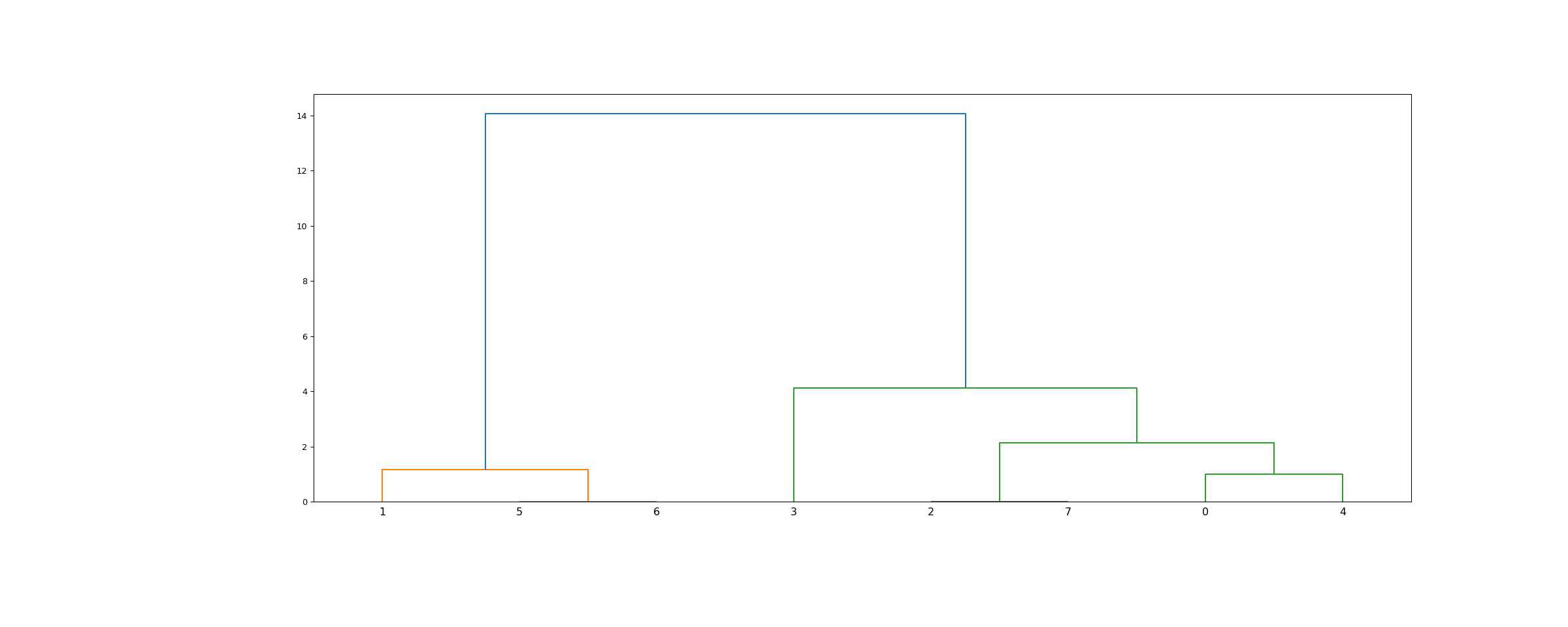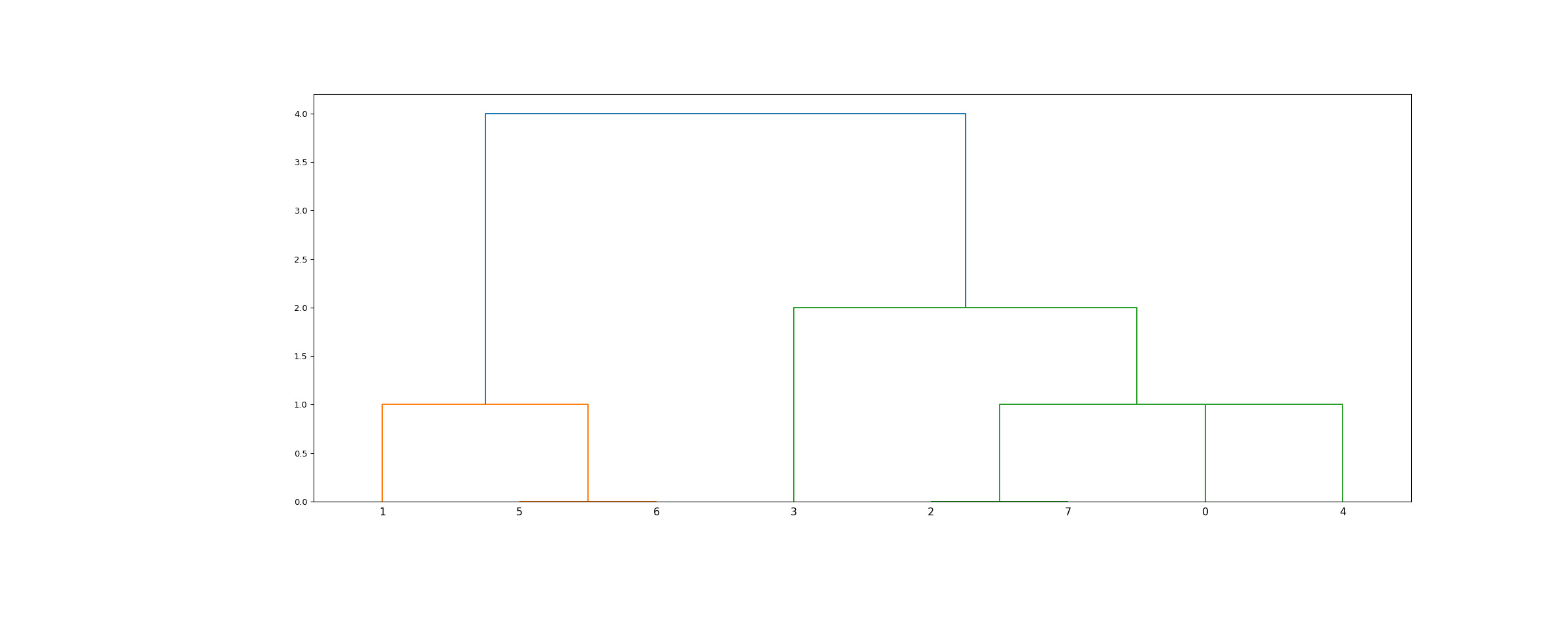本文簡要介紹 python 語言中 scipy.cluster.hierarchy.linkage 的用法。
用法:
scipy.cluster.hierarchy.linkage(y, method='single', metric='euclidean', optimal_ordering=False)#執行分層/凝聚聚類。
輸入 y 可以是一維壓縮距離矩陣或二維觀察向量數組。
如果 y 是一維壓縮距離矩陣,則 y 必須是 大小的向量,其中 n 是在距離矩陣中配對的原始觀測值的數量。此函數的行為與 MATLAB 鏈接函數非常相似。
返回一個 x 4 矩陣
Z。在 -th 迭代中,具有索引Z[i, 0]和Z[i, 1]的集群組合形成集群 。索引小於 的集群對應於 原始觀測值之一。簇Z[i, 0]和Z[i, 1]之間的距離由Z[i, 2]給出。第四個值Z[i, 3]表示新形成的聚類中原始觀測值的數量。以下鏈接方法用於計算兩個簇 和 之間的距離 。該算法從尚未在正在形成的層次結構中使用的集群森林開始。當來自該林的兩個集群 和 組合成一個集群時, 、 和 將從森林中刪除,並將 添加到森林中。當森林中隻剩下一個簇時,算法停止,這個簇成為根。
每次迭代都維護一個距離矩陣。
d[i,j]條目對應於原始森林中簇 和 之間的距離。在每次迭代中,算法必須更新距離矩陣以反映新形成的集群 u 與森林中剩餘集群的距離。
假設在集群 中有 原始觀測值 ,在集群 中有 原始對象 。回想一下, 和 組合在一起形成集群 。讓 是林中不是 的任何剩餘集群。
以下是計算新形成的簇 和每個 之間距離的方法。
method=’single’ assigns
for all points in cluster and in cluster . This is also known as the Nearest Point Algorithm.
method=’complete’ assigns
for all points in cluster u and in cluster . This is also known by the Farthest Point Algorithm or Voor Hees Algorithm.
method=’average’ assigns
for all points and where and are the cardinalities of clusters and , respectively. This is also called the UPGMA algorithm.
method=’weighted’ assigns
where cluster u was formed with cluster s and t and v is a remaining cluster in the forest (also called WPGMA).
method=’centroid’ assigns
where and are the centroids of clusters and , respectively. When two clusters and are combined into a new cluster , the new centroid is computed over all the original objects in clusters and . The distance then becomes the Euclidean distance between the centroid of and the centroid of a remaining cluster in the forest. This is also known as the UPGMC algorithm.
method=’median’ assigns like the
centroidmethod. When two clusters and are combined into a new cluster , the average of centroids s and t give the new centroid . This is also known as the WPGMC algorithm.method=’ward’ uses the Ward variance minimization algorithm. The new entry is computed as follows,
where is the newly joined cluster consisting of clusters and , is an unused cluster in the forest, , and is the cardinality of its argument. This is also known as the incremental algorithm.
警告:選擇森林中的最小距離對時,可能有兩個或更多對具有相同的最小距離。此實現可以選擇與 MATLAB 版本不同的最小值。
- y: ndarray
一個壓縮的距離矩陣。壓縮距離矩陣是包含距離矩陣的上三角形的平麵陣列。這是
pdist返回的形式。或者, 維度中的 觀察向量的集合可以作為 由 數組傳遞。壓縮距離矩陣的所有元素都必須是有限的,即沒有 NaNs 或 infs。- method: str,可選
要使用的鏈接算法。有關完整說明,請參閱下麵的
Linkage Methods部分。- metric: str 或函數,可選
在 y 是觀察向量集合的情況下使用的距離度量;否則忽略。有關有效距離度量的列表,請參閱
pdist函數。也可以使用自定義距離函數。- optimal_ordering: 布爾型,可選
如果為 True,則鏈接矩陣將重新排序,以便連續葉子之間的距離最小。當數據可視化時,這會產生更直觀的樹結構。默認為 False,因為該算法可能很慢,特別是在大型數據集上 [2]。另請參見
optimal_leaf_ordering函數。
- Z: ndarray
層次聚類編碼為鏈接矩陣。
參數 ::
返回 ::
注意:
對於方法‘single’,實現了基於最小生成樹的優化算法。它的時間複雜度為。對於方法‘complete’, ‘average’, ‘weighted’和‘ward’,實現了一種稱為nearest-neighbors鏈的算法。它還具有時間複雜度。對於其他方法,以 時間複雜度實現樸素算法。所有算法都使用 內存。有關算法的詳細信息,請參閱[1]。
僅當使用歐幾裏德成對度量時,方法 ‘centroid’, ‘median’ 和 ‘ward’ 才能正確定義。如果 y 作為預先計算的成對距離傳遞,則用戶有責任確保這些距離實際上是歐幾裏得距離,否則生成的結果將不正確。
參考:
[1]Daniel Mullner,“現代層次、凝聚聚類算法”,arXiv:1109.2378v1。
[2]Ziv Bar-Joseph、David K. Gifford、Tommi S. Jaakkola,“層次聚類的快速最優葉排序”,2001 年。生物信息學 DOI:10.1093/bioinformatics/17.suppl_1.S22
例子:
>>> from scipy.cluster.hierarchy import dendrogram, linkage >>> from matplotlib import pyplot as plt >>> X = [[i] for i in [2, 8, 0, 4, 1, 9, 9, 0]]>>> Z = linkage(X, 'ward') >>> fig = plt.figure(figsize=(25, 10)) >>> dn = dendrogram(Z)>>> Z = linkage(X, 'single') >>> fig = plt.figure(figsize=(25, 10)) >>> dn = dendrogram(Z) >>> plt.show()

相關用法
- Python SciPy hierarchy.leaves_list用法及代碼示例
- Python SciPy hierarchy.leaders用法及代碼示例
- Python SciPy hierarchy.ward用法及代碼示例
- Python SciPy hierarchy.maxRstat用法及代碼示例
- Python SciPy hierarchy.set_link_color_palette用法及代碼示例
- Python SciPy hierarchy.fclusterdata用法及代碼示例
- Python SciPy hierarchy.median用法及代碼示例
- Python SciPy hierarchy.DisjointSet用法及代碼示例
- Python SciPy hierarchy.correspond用法及代碼示例
- Python SciPy hierarchy.is_isomorphic用法及代碼示例
- Python SciPy hierarchy.optimal_leaf_ordering用法及代碼示例
- Python SciPy hierarchy.maxinconsts用法及代碼示例
- Python SciPy hierarchy.cut_tree用法及代碼示例
- Python SciPy hierarchy.fcluster用法及代碼示例
- Python SciPy hierarchy.to_tree用法及代碼示例
- Python SciPy hierarchy.average用法及代碼示例
- Python SciPy hierarchy.dendrogram用法及代碼示例
- Python SciPy hierarchy.num_obs_linkage用法及代碼示例
- Python SciPy hierarchy.inconsistent用法及代碼示例
- Python SciPy hierarchy.complete用法及代碼示例
- Python SciPy hierarchy.maxdists用法及代碼示例
- Python SciPy hierarchy.is_valid_im用法及代碼示例
- Python SciPy hierarchy.centroid用法及代碼示例
- Python SciPy hierarchy.single用法及代碼示例
- Python SciPy hierarchy.is_monotonic用法及代碼示例
注:本文由純淨天空篩選整理自scipy.org大神的英文原創作品 scipy.cluster.hierarchy.linkage。非經特殊聲明,原始代碼版權歸原作者所有,本譯文未經允許或授權,請勿轉載或複製。
